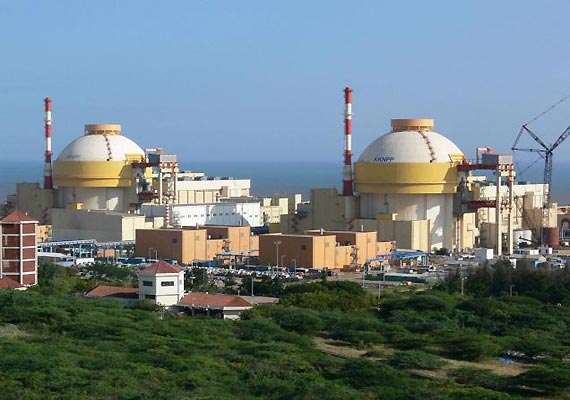Kudankulam N-plant expected to start fission process midnight Sunday
Chennai, July 13: The first unit at Kudankulam Nuclear Power Project (KNPP) is expected to start nuclear fission process midnight Sunday with the process towards it progressing smoothly, said a senior official of India's atomic

Chennai, July 13: The first unit at Kudankulam Nuclear Power Project (KNPP) is expected to start nuclear fission process midnight Sunday with the process towards it progressing smoothly, said a senior official of India's atomic energy regulator.
"Everything is progressing smoothly. It is expected that the first unit is expected to go critical (start nuclear fission process for the first time) at midnight," Atomic Energy Regulatory Board (AERB) secretary R. Bhattacharya told IANS.
India's atomic power plant operator, Nuclear Power Corporation of India Ltd (NPCIL) is setting up two 1,000 MW reactors with Russian technology and equipments at Kudankulam around 650 km from here.
The project which generated severe protest heat by the locals is expected to start generating heat and steam from the 163 uranium fuel bundles loaded in the reactor.
According to officials, for around 15 days, the steam generated will not be used to run the turbine but to observe how the equipment performs. Several low power tests will be carried out in order to verify the conformance of the reactor characteristics to design objectives.
If the reports are satisfactory, then the AERB will give its clearance for the next stage, which is phase wise, increase in reactor power level.
On Thursday evening, armed with the AERB's clearance, the KNPP started its journey towards attaining criticality.
According to NPCIL officials, if everything goes well, the plant would start generating power in 45 days time.
While the power from KNPP will be shared by the southern states, the lion's share will be for the home state Tamil Nadu which is suffering from power deficit.
"Tamil Nadu's share of the 1,000 MW will be 463 MW. As and when the power comes to our grid, it will certainly ease the power shortage to some extent," a senior official at Tamil Nadu Generation and Distribution Corporation Ltd (TANGEDCO) told IANS preferring anonymity.
"The utility sources power from various central power generating units at varied rates but less than Rs.3 per unit whereas the power from KNPP will be over Rs.3 per unit," he added.
The KNPP is an outcome of the inter-governmental agreement between India and the erstwhile Soviet Union in 1988. However, construction began only in 2001 but was delayed mainly due to non-sequential supplies of components from Russian vendors.
Fearing for their safety in the wake of the nuclear accident at Fukushima in Japan in 2011, villagers in the vicinity of the Kudankulam plant, under the banner of People's Movement Against Nuclear Energy (PMANE) have been opposing the project.
City-based environmental activist G. Sundarrajan had filed a case in the apex court demanding the KNPP be scrapped. The court dismissed the case in May and laid down 15 directions for the NPCIL, the AERB, the union environment and forest ministry, the Tamil Nadu government and the state pollution control board to follow.
The AERB gave its clearance after all these agencies filed their reports with the apex court last week.
"Everything is progressing smoothly. It is expected that the first unit is expected to go critical (start nuclear fission process for the first time) at midnight," Atomic Energy Regulatory Board (AERB) secretary R. Bhattacharya told IANS.
India's atomic power plant operator, Nuclear Power Corporation of India Ltd (NPCIL) is setting up two 1,000 MW reactors with Russian technology and equipments at Kudankulam around 650 km from here.
The project which generated severe protest heat by the locals is expected to start generating heat and steam from the 163 uranium fuel bundles loaded in the reactor.
According to officials, for around 15 days, the steam generated will not be used to run the turbine but to observe how the equipment performs. Several low power tests will be carried out in order to verify the conformance of the reactor characteristics to design objectives.
If the reports are satisfactory, then the AERB will give its clearance for the next stage, which is phase wise, increase in reactor power level.
On Thursday evening, armed with the AERB's clearance, the KNPP started its journey towards attaining criticality.
According to NPCIL officials, if everything goes well, the plant would start generating power in 45 days time.
While the power from KNPP will be shared by the southern states, the lion's share will be for the home state Tamil Nadu which is suffering from power deficit.
"Tamil Nadu's share of the 1,000 MW will be 463 MW. As and when the power comes to our grid, it will certainly ease the power shortage to some extent," a senior official at Tamil Nadu Generation and Distribution Corporation Ltd (TANGEDCO) told IANS preferring anonymity.
"The utility sources power from various central power generating units at varied rates but less than Rs.3 per unit whereas the power from KNPP will be over Rs.3 per unit," he added.
The KNPP is an outcome of the inter-governmental agreement between India and the erstwhile Soviet Union in 1988. However, construction began only in 2001 but was delayed mainly due to non-sequential supplies of components from Russian vendors.
Fearing for their safety in the wake of the nuclear accident at Fukushima in Japan in 2011, villagers in the vicinity of the Kudankulam plant, under the banner of People's Movement Against Nuclear Energy (PMANE) have been opposing the project.
City-based environmental activist G. Sundarrajan had filed a case in the apex court demanding the KNPP be scrapped. The court dismissed the case in May and laid down 15 directions for the NPCIL, the AERB, the union environment and forest ministry, the Tamil Nadu government and the state pollution control board to follow.
The AERB gave its clearance after all these agencies filed their reports with the apex court last week.